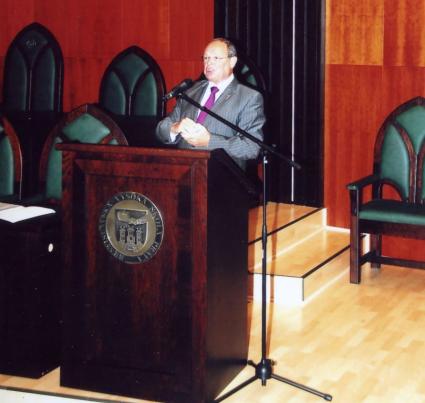Meetings in Bratislava with Academics, Students and Professionals (13-15 May 08)
At the Invitation of the Deans of the Bratislavska Vysoka Skola Prava Faculty of Law and the Komenskeho University of Bratislava Faculty of Law, the President of the UIHJ, D.H.C. Jacques Isnard, gave, in the Presence of Many Academics, Two Conferences to Student Judges and Professionals on the Topic “the Judicial Officer in 2008: Quo Va Dis?”
Jacques Isnard, President of the UIHJ

Weakening of a Fragmented System of the Judicial Officer
It was about on the one hand, carrying out a comparative presentation of judicial officers and enforcement agents in the European Union (EU) by underlining the irresistible emergence of the liberal, private and independent judicial officer to the detriment of the civil servant enforcement agent.
The Speaker tried to clarify the weakening of fragmented system of judicial officer, whose condition of liberal professional was constantly deviating towards the concept of “civil servant”, which maintained a perpetual conflict appreciation, not very favorable at supporting a harmonization of the profession.
According to the speaker, to obviate any confusion it could seems judicious to adopt a liberal statutory mode of judicial officers copied on the system in force in France and in certain Neighboring states.
Thus, one could promote the concepts of public and ministerial officer and that of auxiliary of justice for better characterizing this - remaining very ambiguous - position of auxiliary of justice and agent of the creditor.
In the middle of the problem, one runs up against the difficult question of the delegation of public power towards judicial officers, which comes with the monopoly of distraint and sometimes also with the service of documents.
The question of the delegation of public power towards independent professionals always gives way to criticisms. Certain Member States maintain their hostility by advancing a constitutional incompatibility.
Independence of the Judicial Officer With Respect to the Judge
In a different register another controversy remains: that of the independence of the judicial officer with respect to the judge. Two conceptions are opposed in the EU: one where the judge is omnipresent and where each stage of the procedure is subject to an authorization, the other, undoubtedly more effective, where the judge only intervenes to settle disputes while abstaining from involving himself in the engaged activity between parties to the enforcement.
What about Europe?
The whole of its measures, aiming at implementing an area of freedom, security and justice, is in the middle of the concerns both of the EU (European Enforcement Order - European Order For Payment, etc.) and the Council of Europe (Recommendation Rec (2003) 17 of September 9th, 2003), of its component the CEPEJ as well as the ECHR (jurisprudence under Article 6).
Answering the questions of the audience, Jacques Isnard was to stress the importance for the European Union to have a “European” judicial officer with a harmonized status to preserve legal security, an essential element in the field of economic and international relations.
The debates with the audience were to be chaired successively by Mr. Maryan Vrabko, Dean of the Komenskeho University, and Professor Stevcek of the Bratislavska faculty.
Besides the conferences, president Isnard met D.H.C. Vladimir Cecot, Secretary of State of Internal Affairs, and Mr. Milan Karabin, President of the Supreme Court.


